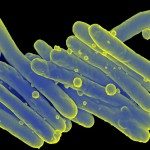Lien vers Pubmed [PMID] – 29116628
Adv. Exp. Med. Biol. 2017;1019:27-41
Genome-based insights into the evolution of Mycobacterium tuberculosis and other tuberculosis-causing mycobacteria are constantly increasing. In particular, the recent genomic and functional characterization of several Myocbacterium canettii strains, which are thought to resemble in many aspects the putative common ancestor of the members of the M. tuberculosis complex (MTBC), has consolidated a plausible scenario of the early evolution of tuberculosis-causing mycobacteria, in which the clonal MTBC, comprising numerous key pathogens of mammalian hosts, has evolved from a generalist mycobacterium living in the environment. These studies also have considerably enriched our knowledge on selected molecular events that likely have contributed to the incursion, maintenance and spread of the MTBC members in diverse mammalian hosts. Here, we summarize and discuss recently revealed molecular and evolutionary aspects and emphasize the vast utility of M. canettii strains for identifying the mechanisms that contributed to the global emergence of M. tuberculosis as one of the most important human pathogens.

